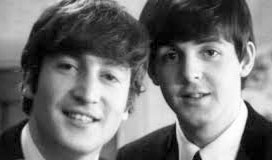I readily concede that John Lennon, namesake of Liverpool’s international airport, was a remarkable singer, with extraordinary power and even musicality, as witness his swoon-inducing Smokey Robinsonisms before the last chorus of Eight Days a Week. Maybe most remarkably, he never sounded like anyone but himself, even while Paul McCartney, after whom no airport has yet been named, occasionally aped the likes of Little Richard and Fats Domino. But there were dozens of sensational singers in the British beat boom of the early 1960s, and only a knucklehead would say that Lennon’s iconically fervent, soulful vocal on Twist and Shout was more fervent and soulful than, for instance, Ray Ennis’s on The Swinging Blue Jeans’ Hippy Hippy Shake?
Lots of groups had great singers, but what made The Beatles (and The Hollies) ultradeluxe was that they also had a terrific harmoniser. Imagine If I Fell, for instance, without McCartney’s harmony part. Do you suppose it would be even half as glorious?
In the beginning, they’d both written highly derivative rock and roll songs. Which of Lennon’s — the perfectly awful One After 909, maybe? — has endured as McCartney’s I Saw Her Standing There has?
When he was ingesting too much LSD, Lennon defiantly stopped making sense and channeled Lewis Carroll. Some of his wordplay was fun galore, but was any of it much better than that in McCartney’s I’ve Got a Feeling? And which wrote the most poignant third-person song in the Beatles canon, Eleanor Rigby, and who the band’s most heartfelt and affecting song about emotional desolation, For No One?
A lot of people, following Lennon’s lead, disdain McCartney’s cute vaudevillisms — When I’m 64, for instance, and Maxwell’s Silver Hammer. They are so brazenly non-rock, dude! As though there’s something sacrosanct about rock and roll. Well, I, for one, find them considerably more enjoyable than Lennon’s studied thuggishness in, say, She’s So Heavy or Yer Blues. Can we not agree that, in the post-touring era, Lennon wrote far more than his share of crap — Good Morning, Good Morning, anyone, or Being For the Benefit of Mr. Kite?
As melodists, there was no comparison. Lennon’s Across the Universe is exquisite, but I’d venture to say his output of exquisite melodies was maybe a tenth that of the man Aunt Mimi is famous for having called “your little friend.” And how very lazy Lennon could be, as at the beginning of the verses of Help!,, in which, rather than devising a proper melody, he sings the same note nine times in a row. Or is it 10?
McCartney, on bass, was a revelation. Lennon’s lead guitar playing on the unspeakable Ballad of John and Yoko, the worst song in Beatles history — if you don’t count such Harrison creations as You Like Me Too Much, Blue Jay Way, and Not Guilty — is appalling. Behold the difference!
We remember and scoff at McCartney’s icky post-Beatles expressions of the perfection of his and Linda’s love, but are they really more cloying than (let alone as incomprehensible as) Lennon’s expressions of devotion to Yoko, for whom I have not yet, 50 years after the fact, managed to develop a taste?
It all began for America, of course, when The Beatles appears on The Ed Sullivan Show. Spend half an hour on YouTube and tell me which Beatle exuded infectious joy at being where he’s always wanted to be (in the spotlight), doing exactly what he’s always wanted to do (sing and play rock and roll). Tell me which of them, by exuding that joy, was principally responsible for The Beatles being THE BEATLES!!!
“The Walrus,” John Lennon sarcastically “revealed” in Glass Onion, “was Paul.” Well, if you ask me, The Beatles were largely Paul.
[It was naughty of you not to have read this 24 hours ago in my new ezine!]



